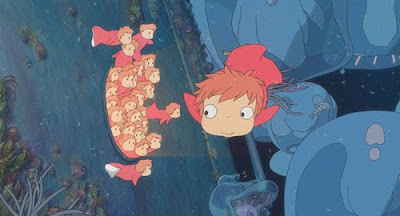
In Hayao Miyazaki's delightful and wondrous new film, Ponyo on the Cliff by the Sea (2008), the very balance of nature is upset by the onset of mermaid puberty. Ponyo (voiced by Noah Cyrus in the English-language version), like many Miyazaki characters, inhabits an enchanted state of in-betweeness. The daughter of an ocean goddess (Cate Blanchett) and a magician (Liam Neeson), who renounced his human citizenship to live under the sea and who buys his clothes at the same place as the David Bowie character in Labyrinth (1986), Ponyo spends most of the movie vacillating between being a fish and being a girl--much to the dismay of her father, who wishes she could remain "innocent and pure forever"--and in her in-between state, has feet with three toes that look like a duck's. (I'm reminded of the protagonist of Virginia Woolf's great novel Orlando: A Biography [1928], who lives for two hundred years as a man, and then another two hundred as a woman, but never as a duck.) Given this fluidity of identity, it's hardly surprising that Miyazaki would choose to set this story by the ocean.
In Asia, Miyazaki is a populist figure roughly equivalent to Walt Disney (except that the political bent of his work is more environmentalist than southern confederate), and when I was in Busan last year, Ponyo was playing everywhere. But when I finally caught up with this film, which has been following me around the world (a French version was playing in Geneva in April), in Halifax there were hardly any children in the theatre. Nor were there many children in the theatre when I went to see Miyazaki's previous film, Howl's Moving Castle (2005), a few years ago. My point isn't that his films are inappropriate for children, but that they are appropriate for grownups. Miyazaki's nuanced empathy for all of his characters displays a lot more maturity than most films intended exclusively for grownups, like No Country for Old Men, There Will Be Blood (both 2007), and Slumdog Millionaire (2008), which all have clear-cut good guys and bad guys. That the closest thing to a purely unsympathetic character in Ponyo is a distrustful old woman (Lily Tomlin) is itself almost an indictment of the misanthropy of a film like No Country for Old Men. Miyazaki is not only the world's greatest maker of children's films, but one of the world's greatest living filmmakers, period.
Sunday, August 16, 2009
Ponyo on the Cliff by the Sea
Subscribe to:
Post Comments (Atom)
and lliked it too!
ReplyDelete